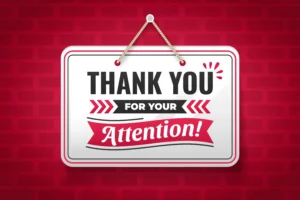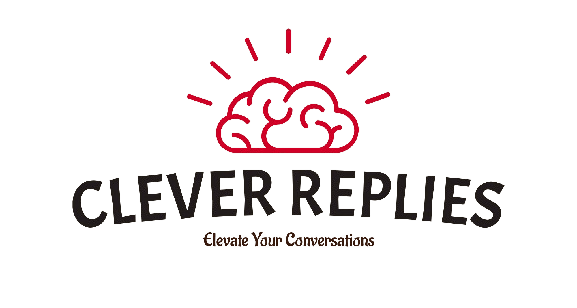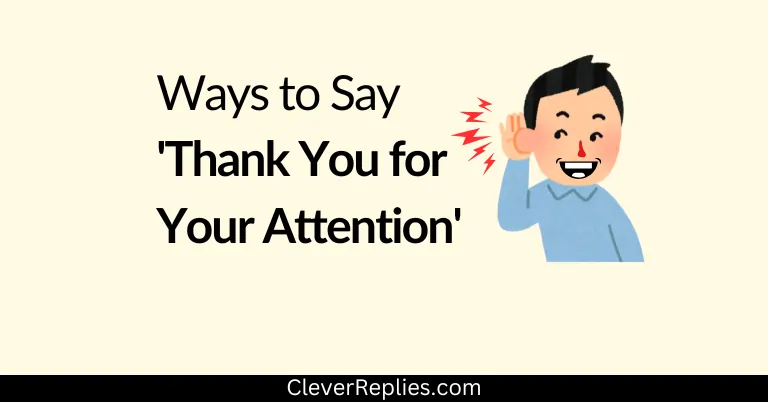21+ Ways to Say ‘Thank You for Your Attention’ in Any Setting
With endless distractions competing for our focus, capturing someone’s full attention has become a rare privilege.
When someone grants you their focus, it’s an act worth acknowledging. Saying “Thank you for your attention” is a powerful way to recognize and appreciate someone’s time and effort.
In this post, I’ll share 20 ways you can thank someone for their attention, so you’ll always know the perfect thing to say.
Quick Tips for Making Your Gratitude More Impactful
The power of gratitude lies in how you make someone feel. When your words are delivered with genuine appreciation, you not only strengthen your connection but also build rapport for future interactions.
Here are some quick tips to ensure your gratitude resonates:
- Keep it sincere: People can tell when gratitude is genuine. Don’t just say it for the sake of saying it—let them feel your appreciation.
- Be timely: The best time to say “thank you for your attention” is when it’s most relevant. Saying it at the end of a presentation, conversation, or meeting shows you value their focus at the moment it matters most.
- Personalize it: If you can, tailor your gratitude to the individual. For example, instead of just saying “Thank you for your attention,” add something like “I appreciate you sticking with me through that long story.”
- Show respect for their time: People’s time is precious. Acknowledge the effort they’ve made to be present and engaged.
20 Ways to Say “Thank You for Your Attention” | Best Alternatives

When it comes to expressing gratitude, how you say “thank you for your attention” can vary depending on the situation.
Expressing gratitude for someone’s attention is a simple but effective way to make them feel valued. Whether you’re speaking casually with a friend or giving a presentation in front of a room full of people, acknowledging someone’s focus can strengthen your connection and leave a lasting impression.
Here are 20 different ways to say “thank you for your attention” in various situations, along with some tips for making your gratitude even more impactful.
1. Casual Conversations
People love feeling appreciated, especially in informal conversations.
When chatting with friends or engaging in casual conversations, a simple thank you can make the moment feel more genuine without making things too formal.
Here are some phrases to express appreciation in a casual manner:
- “Thanks for listening!”
- “I really appreciate your attention!”
- “Thanks for staying with me on this!”
- “You’re awesome for paying attention—thank you!”
- “I appreciate you hanging in there with me—thanks a ton!”
Using these expressions when telling a story keeps the atmosphere light and friendly. It shows appreciation without interrupting the flow of the conversation, creating a positive, engaging vibe.
ALSO READ: Thank You For All You Do: 65+ Heartfelt Messages to Use
2. Business & Professional Settings
In a business environment, A thoughtful thank-you at the right moment can leave a lasting impression.
Here are some examples of that:
- “I appreciate your focus on this matter.”
- “Thank you for prioritizing this issue.”
- “I am grateful for your attention and your time today.”
- “Your engagement during this discussion means a lot—thank you.”
- “Thank you for dedicating your attention & energy to this discussion.”
When using these phrases, ensure your tone remains sincere—people can tell when gratitude is genuine, which makes all the difference.
3. Written Communication
Emails and written reports are an essential part of business communication. But they can often come across as impersonal.
Adding a simple thank-you to the end of a message or report can significantly help cover this gap!
Check these examples:
- “Thank you for taking the time to review this.”
- “I appreciate your attention to the details outlined here.”
- “I truly appreciate you taking the time to carefully consider this.”
- “Thank you for your careful review and thoughtful feedback on this.”
- “Your thoughtful consideration of this matter is greatly valued—thank you.”
You can use these phrases while interacting with your colleagues, clients, or partners.
Acknowledging their efforts in reading or considering your message adds a touch of sincerity to otherwise transactional communication.
4. Public Speaking
When speaking in front of an audience, thanking your listeners is a powerful way to acknowledge their time and attention.
Here, You May Use:
- “I appreciate you all being so engaged.”
- “Grateful for such a focused audience—thank you!”
- “Thank you all for being such an attentive audience.”
- “You’ve been awesome for listening, thank you!”
- “It’s been a privilege speaking to such engaged listeners—thank you.”
Acknowledging the attention of the audience helps create a sense of connection.
I’ve noticed that during public speaking events, thanking the audience for their focus not only boosts engagement but also makes the atmosphere more interactive and collaborative. It’s a subtle way to create a bond with your listeners.
5. Playful Scenarios
Sometimes, you want to thank someone in a way that’s a bit more playful or unique.
Here are some fun alternatives to “Thank You for Your Attention” that can work in casual settings or when you want to inject a little humor:
- “Thanks for being all ears!”
- “Thanks for tuning in and not zoning out!”
- “Thanks for sticking around, you’re the real MVP!”
- “Appreciate you sticking with me—it’s been a wild ride, hasn’t it?”
- “You could’ve been anywhere, but you’re here listening to me—thank you!”
These phrases are perfect for social media posts or informal meet-ups when you want to express your gratitude with a bit of humor or creativity.
ALSO READ: How to Respond to WSG (What’s Good)?
Alternatives of “danke für eure aufmerksamkeit”
Many of our readers from Germany have requested alternatives to saying “Danke für eure Aufmerksamkeit” in their language, so here’s a list of phrases that offer different tones and levels of formality for expressing gratitude for someone’s attention in german.
#1. „Danke, dass ihr zugehört habt!“
#2. „Danke, dass ihr dabei wart!“
#3. „Ich danke euch fürs Zuhören!“
#4. „Schön, dass ihr euch die Zeit genommen habt!“
#5. „Ich schätze eure Aufmerksamkeit sehr!“
#6. „Vielen Dank für Ihre geschätzte Aufmerksamkeit.“
#7. „Ich danke Ihnen für Ihr Interesse und Ihre Zeit.“
#8. „Herzlichen Dank für Ihre Aufmerksamkeit und Ihr Engagement.“
#9. „Es war mir eine Freude, Ihre Aufmerksamkeit zu haben.“
#10. „Ich danke Ihnen für Ihre konzentrierte Aufmerksamkeit.“
#11. „Danke, dass ihr mir zugehört habt – ihr seid die Besten!“
#12. „Ich danke euch für eure geballte Aufmerksamkeit!“
#13. „Eure Aufmerksamkeit ist goldwert, vielen Dank!“
#14. „Danke, dass ihr nicht eingeschlafen seid!“
#15. „Ich bin dankbar für eure Ohren!“
Final Thoughts
No matter where you are or who you’re speaking to, taking a moment to say “thank you for your attention” can go a long way in fostering positive relationships and effective communication.
Whether you’re in a casual setting, a formal meeting, or just reaching out via email, the right words can make all the difference.
So, next time someone gives you their undivided attention, don’t hesitate to acknowledge it with one of these thoughtful phrases. And if you’ve got a favorite phrase that works wonders for you, drop it in the comments—I’d love to hear how you express your thanks!
Similar Articles:
FAQs
1. When should I say “Thank you for your attention”?
You can use this phrase whenever someone has been actively listening or focusing on what you’re saying. It’s most commonly used at the end of a presentation, speech, or discussion, but can also work in casual conversations when you feel someone has given you their undivided attention.
2. Why is it important to acknowledge someone’s attention?
Acknowledging someone’s attention is a powerful way to show respect. It strengthens relationships, encourages better communication, and builds rapport. Plus, it reminds them that their time and focus are valuable to you.
3. Is “Thank you for your attention” too formal?
While it can sound formal, the phrase isn’t rigid or stiff. It’s polite and professional, making it suitable for both formal and informal settings, depending on your tone. In more casual settings, you might tweak it to something friendlier, like “Thanks for listening!” or “I appreciate you sticking with me.” So, no, it doesn’t have to be too formal; you can adjust it as needed.

